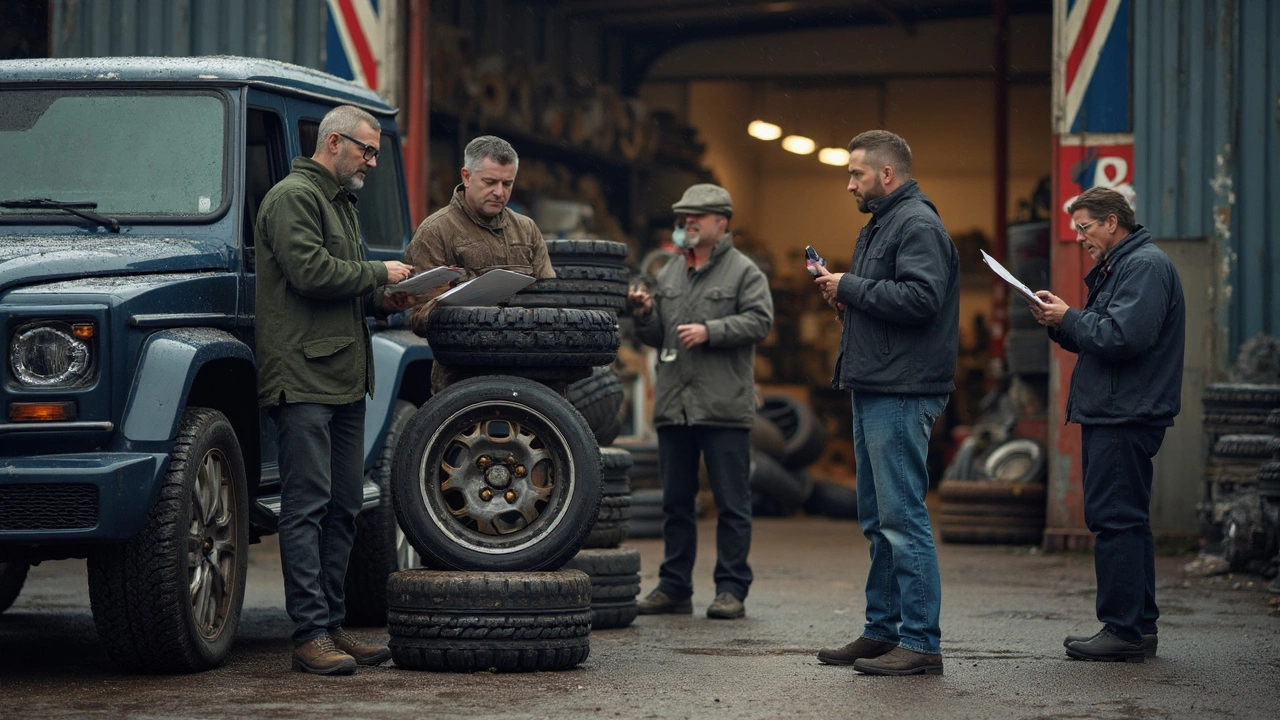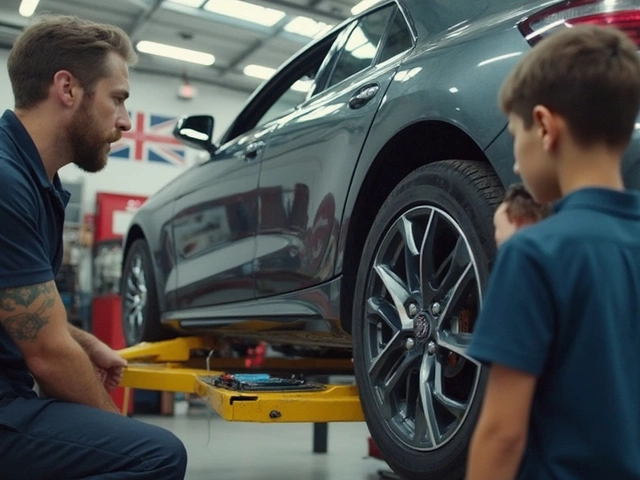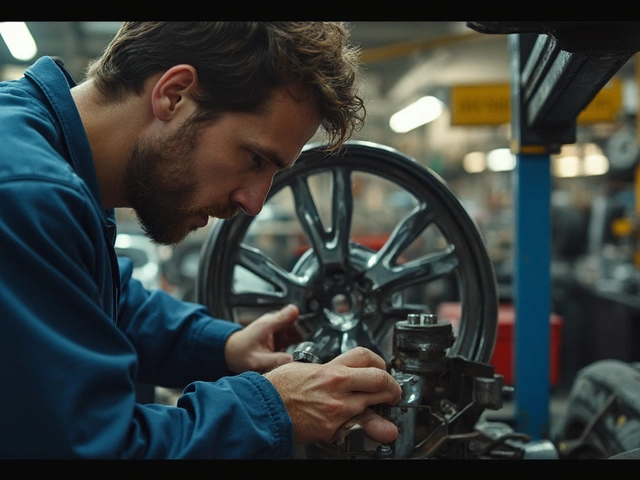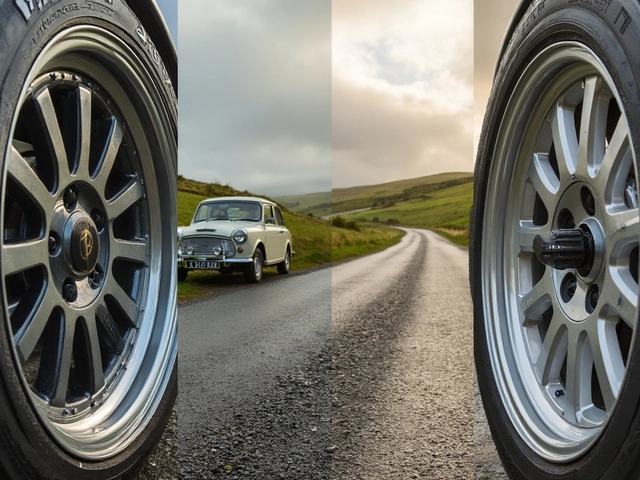If you’ve got a stack of beat-up alloy wheels sitting in your shed, you might be staring at a few quick bucks—literally. Alloy wheels aren’t just eye candy for cars; when they’re past their prime, they pack enough aluminum to catch scrap dealers’ attention.
So, how much can you really get for your worn-out wheels? Scrap value isn’t pulled out of thin air. It comes down to the current price of aluminum, the weight of your wheels, and a few things dealers look for before handing over the cash. Alloy wheels are usually made mostly from aluminum, which is always in demand for recycling. But not all alloys are the same, and some might have traces of other metals, which can influence the scrap value.
You don’t have to be a metal expert to cash in. What matters is knowing what dealers want and how the scrap game works. That helps you get every dollar your old rims are worth—and maybe avoid getting shortchanged. Let’s break down what goes into the price, what you can expect when you show up at the yard, and how to squeeze the most out of your scrap wheels.
- What Makes Alloy Wheels Valuable for Scrap?
- How Scrap Prices Are Set
- Things That Affect Your Payout
- Best Practices Before Scrapping
- Where and How to Sell
What Makes Alloy Wheels Valuable for Scrap?
It all comes down to metal—the main reason alloy wheels bring in decent scrap value is their aluminum content. Most factory and aftermarket wheels are made from aluminum alloys, which are lightweight and don’t rust, making them a hot ticket for recycling. In fact, aluminum recycling takes up to 95% less energy than creating new aluminum from raw ore, so there’s a strong demand from scrap yards and smelters.
Aluminum isn’t the only thing in the mix, though. Alloy wheels can have small amounts of magnesium, nickel, or even a bit of iron in their construction, depending on the manufacturer. These extra metals can make a difference in scrap value, but aluminum is the main deal.
- Weight matters: Most standard alloy wheels weigh between 7 and 14 kg each. Scrap yards pay by the kilo, so heavier wheels mean more money.
- Wheel condition: Wheels don’t need to look pretty to get scrapped. Even bent, cracked, or corroded rims still have value because it’s the metal, not the shape, that counts.
- Clean vs. dirty scrap: If your alloy wheels have tires, weights, or valve stems still attached, you might get paid less per kilo since the dealer has to remove that stuff. Clean wheels (just bare alloy) usually get a better rate.
To give you an idea of what’s inside, here’s a rough breakdown of a typical 17-inch factory alloy wheel:
| Component | Approximate Content (%) |
|---|---|
| Aluminum | 85-92% |
| Magnesium | 1-4% |
| Other metals (nickel, iron, etc.) | 1-3% |
| Impurities/Coatings | Up to 10% |
Because aluminum prices change week to week, the scrap value isn’t fixed. But the more pure and heavy the wheel, the higher your payout. That’s why many scrappers strip off anything that’s not aluminum and aim to sell clean, bare alloy wheels when they can.
How Scrap Prices Are Set
Here’s where things get real: the scrap value for alloy wheels is pretty much tied to the going rate for aluminum. Scrap yards set their prices based on the metal markets, which change every day—sometimes even by the hour. If aluminum demand is high in big markets like China or the US, the price jumps. If factories slow down, that price falls. It’s all about supply and demand.
A typical alloy wheel weighs between 7 and 10 kilograms (15–22 pounds) for most cars. Alloy content is mostly aluminum (often around 85% or more), but the exact makeup can vary. Higher purity wheels usually get better rates. Scrap yards tend to pay by the kilo or pound, and you’ll usually see a posted rate for “clean” (no tires, valve stems, or weights) versus “dirty” (with stuff still attached) wheels.
- As of early 2025, the average scrap price for clean aluminum alloy is around $0.70 to $1.00 per pound in the US, and £0.70 to £1.10 per kilo in the UK. These rates swing a lot, so always check right before you sell.
- Wheels with steel inserts, wheel weights, or chunks of rubber still attached usually fetch a lower rate—sometimes 20% less—because yards have more work before recycling.
- Some yards charge a fee or pay almost nothing for painted, chromed, or heavily corroded wheels because processing is tougher.
Here’s a quick snapshot of what you might see on the price board:
| Wheel Type | 2025 US Avg. Price | 2025 UK Avg. Price |
|---|---|---|
| Clean Alloy Wheel | $0.85 / lb | £0.95 / kg |
| Dirty Alloy Wheel | $0.65 / lb | £0.75 / kg |
Final tip: Prices you find online are just a starting point. Call your local yard and ask what they pay for scrap alloy wheels right now. That’s the number that matters in the end.
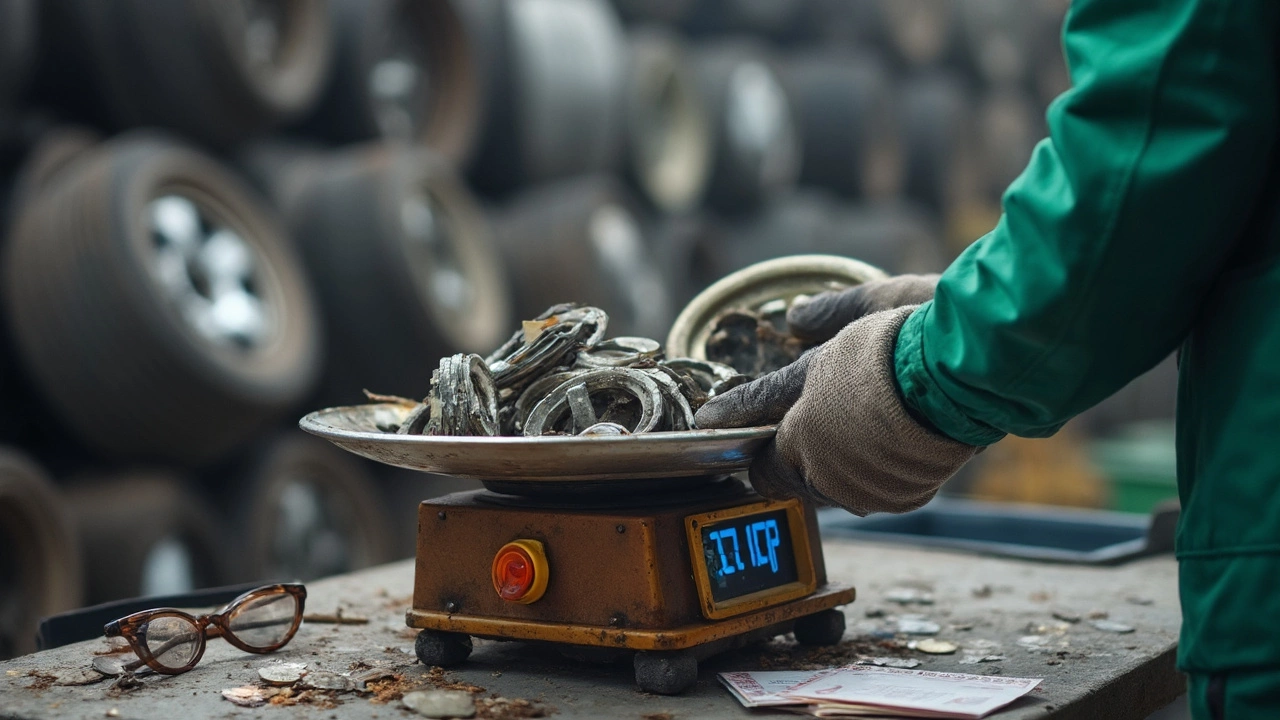
Things That Affect Your Payout
Not all alloy wheels are equal in the scrap world. If you’re after the best scrap value for your alloy wheels, you’ll want to know exactly what yards look at before quoting a price.
- Material purity: Most alloy wheels are about 85-90% aluminum, but some have extra metals mixed in for strength or style. The more pure aluminum, the more cash you get. Dirty wheels—meaning ones still attached to tires, valve stems, lead weights, or plastic center caps—get you a “dirty” aluminum price, which is a lot less than pure, clean alloy.
- Weight: Scrap is bought by the kilo or pound. Bigger, heavier wheels mean more money in your pocket. Four standard 17” alloy wheels (cleaned up) usually weigh around 40-50kg together, which is a decent chunk of aluminum.
- Current metal market price: The going rate for aluminum changes, sometimes daily. If the price is up (like during a global shortage), it’s a good time to cash in. In April 2025, for example, UK scrap yards are offering between £0.85 and £1.10 per kilo of clean alloy wheels, depending on the day and dealer.
- Condition: Scrapyards pay the same for shiny or scratched wheels, but if yours are cracked, bent, or caked with brake dust and grime, yards might offer you less, calling them “dirty” scrap. Really bad wheels sometimes get downgraded further.
- Quantity: If you’re selling a bunch of wheels, you might get a better bulk rate. A single wheel is fine, but showing up with eight or twelve can sometimes get you a bump in price per kilo.
Here's a quick look at how prices can shift depending on how clean your wheels are:
| Type of Alloy Wheel | Typical Price per kg (April 2025, UK) |
|---|---|
| Clean (no tire, stems, weights) | £0.90 - £1.10 |
| Dirty (tire, weights, or stems attached) | £0.50 - £0.65 |
Want to squeeze even more out of your scrap? Strip off anything that isn’t metal before heading to the yard. And always check the latest metal prices before loading up your old wheels—sometimes waiting a week or two pays off big time.
Best Practices Before Scrapping
Before dragging your alloy wheels down to the yard, a bit of prep work can put extra cash in your pocket. Simple steps help scrap dealers see you know what you’re doing—meaning better offers and zero surprises.
- Remove tires and valve stems. Alloy wheels with tires still on usually get a big price cut at the yard. Dealers pay for clean alloy wheels, not the rubber or plastic bits. If you can, pop the tires off yourself or at least head to a tire shop. Expect to pay a few bucks per tire, but you’ll earn that back—and then some—on the scrap value.
- Give them a quick clean. Mud, dust, and old brake dust don’t add value. It’s not about making them look pretty; it’s just so the dealer can actually see the metal. A garden hose or a wipe-down works.
- Check for steel inserts or wheel weights. Some alloy wheels have extra bits of metal for balance or reinforcement. These steel clips or wheel weights drop your price, since yards want pure aluminum. Take a magnet with you—if it sticks, pull that piece off.
- Sort your wheels. If you’ve got fancy brands (think OEM BMW, Mercedes, or performance wheels), check if collectors or tuners pay more than scrap yards. Some wheels might fetch double (or even more) on places like Facebook Marketplace, eBay, or specialized forums.
Dealers pay by weight, so it helps to know what you’re carrying. The average 17-inch alloy wheel weighs about 10-12 kg (22-26 lbs) without any tires or extra hardware. Here’s a quick comparison:
| Wheel Size | Avg. Alloy Weight (kg) | Expected Scrap Value* (USD) |
|---|---|---|
| 15" | 8-9 | $10-$16 |
| 17" | 10-12 | $15-$25 |
| 19" | 13-14 | $22-$30 |
*Based on April 2025 US average aluminum scrap prices at $1.20/lb for clean material.
If you need to haul a stack of wheels, call ahead and see if the yard has a minimum amount or special rate for larger piles—they sometimes do.
Bottom line: scrub, strip, and sort. It’s all about giving the scrap dealer what they want—clean, pure alloy wheels. The less junk attached, the more money you’ll see.
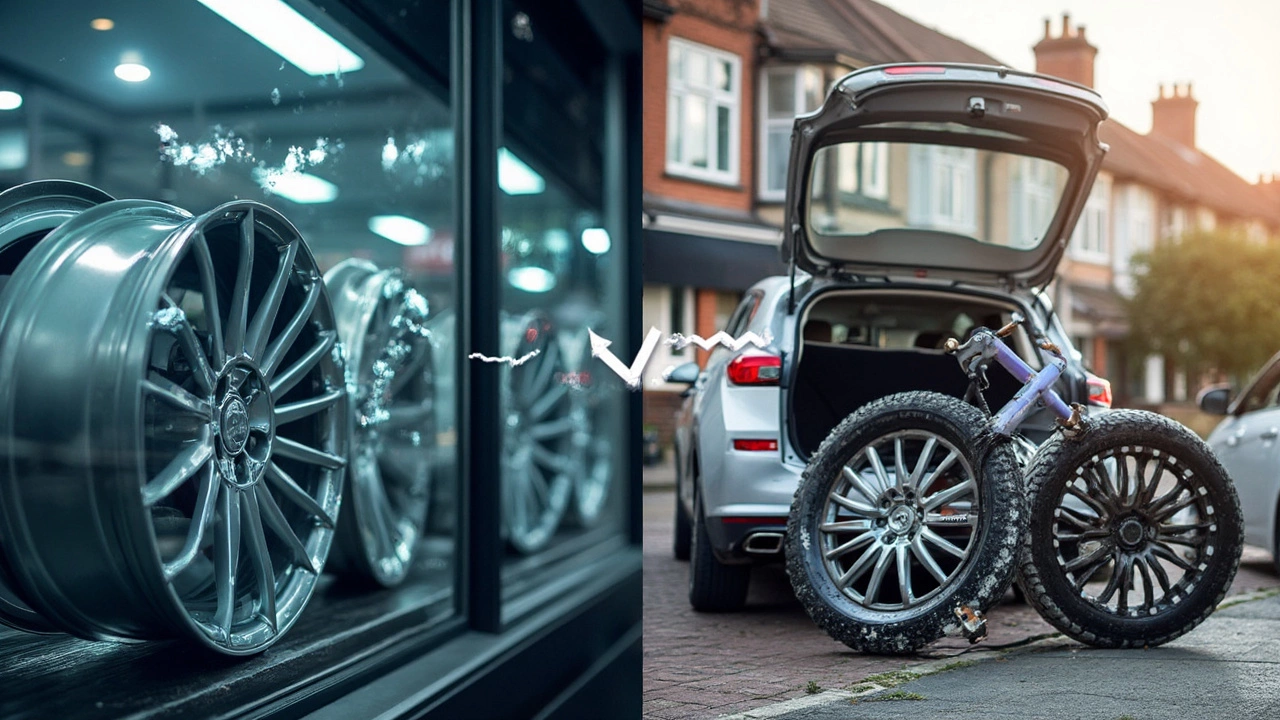
Where and How to Sell
So, you’re ready to turn those old alloy wheels into some instant cash. Where do you start? Not all buyers are the same, and you’ll want to get the best deal for your wheels’ actual scrap value.
The go-to spot is your local scrapyard or metal recycling center. Most of them pay by the weight, and since aluminum is in high demand, you’ll usually get a decent price. Some yards only take stripped wheels with tires, stems, and balancing weights removed, while others might take the whole thing and deduct a bit for the extra material.
Here's a quick rundown of your selling options:
- Scrapyards and Metal Recyclers: Find one with good online reviews or recommendations from local auto shops. Prices can change daily, so ask about today’s metal prices before you drive over.
- Online Marketplaces: Places like Facebook Marketplace or Craigslist sometimes have buyers looking for scrap wheels, but these deals aren’t always as simple as the scrapyard drop-off.
- Specialized Alloy Recyclers: Some businesses focus just on alloy wheels. They may offer better rates for wheels in certain conditions or with rare metals.
Don’t forget to weigh your wheels ahead of time if you have a scale. Most alloy wheels weigh between 15 and 25 pounds each. Here’s a rough estimate of what your cash might look like, assuming the average scrap value for aluminum is $0.60 per pound (as of early 2025):
| Number of Wheels | Total Weight (lbs) | Estimated Payout |
|---|---|---|
| 2 | 40 | $24 |
| 4 | 80 | $48 |
Before you sell, call around for quotes. Not all scrapyards pay the same, and some charge small fees if your wheels aren’t stripped. Always double-check if the price connects to pure aluminum or a mixed alloy rate.
To sum it up, your best bet for quick, simple sales is the scrapyard or metal recycler. If you have rarer wheels or want to gamble for a higher price, try online groups or specialty buyers. Either way, a little research goes a long way to get the most for your old alloy wheels.

